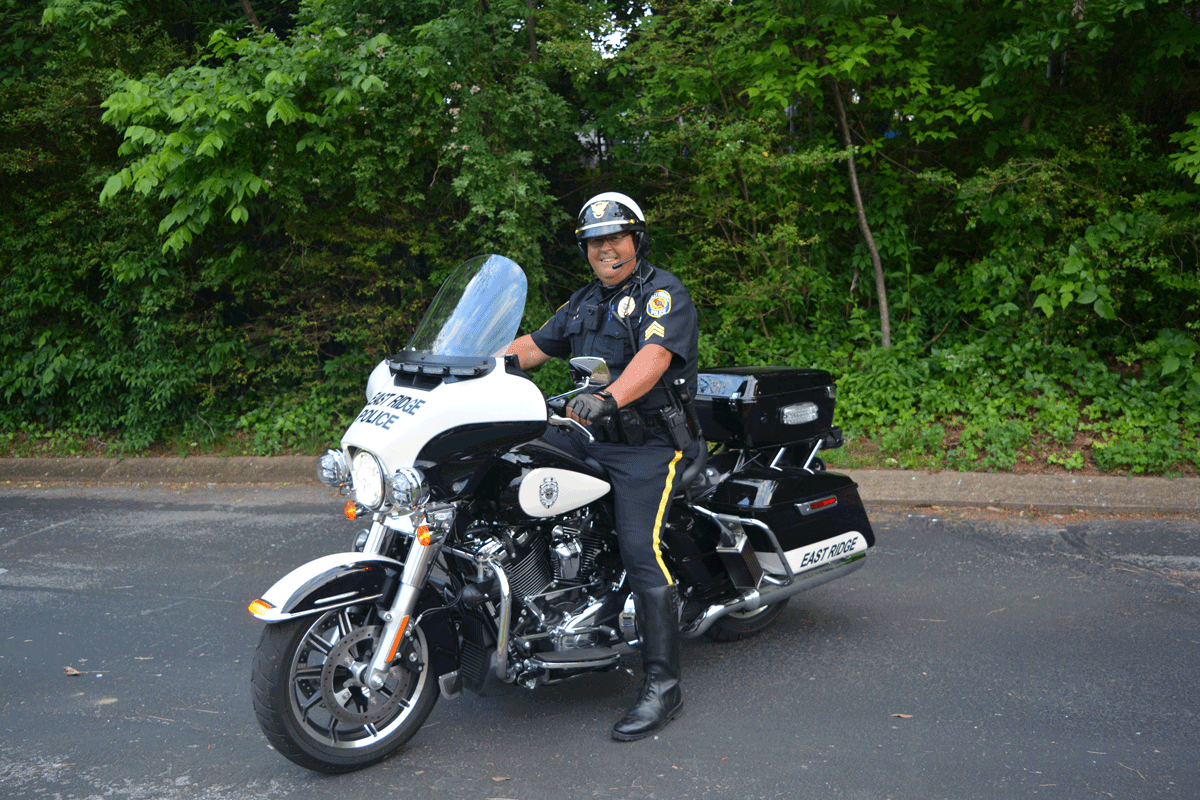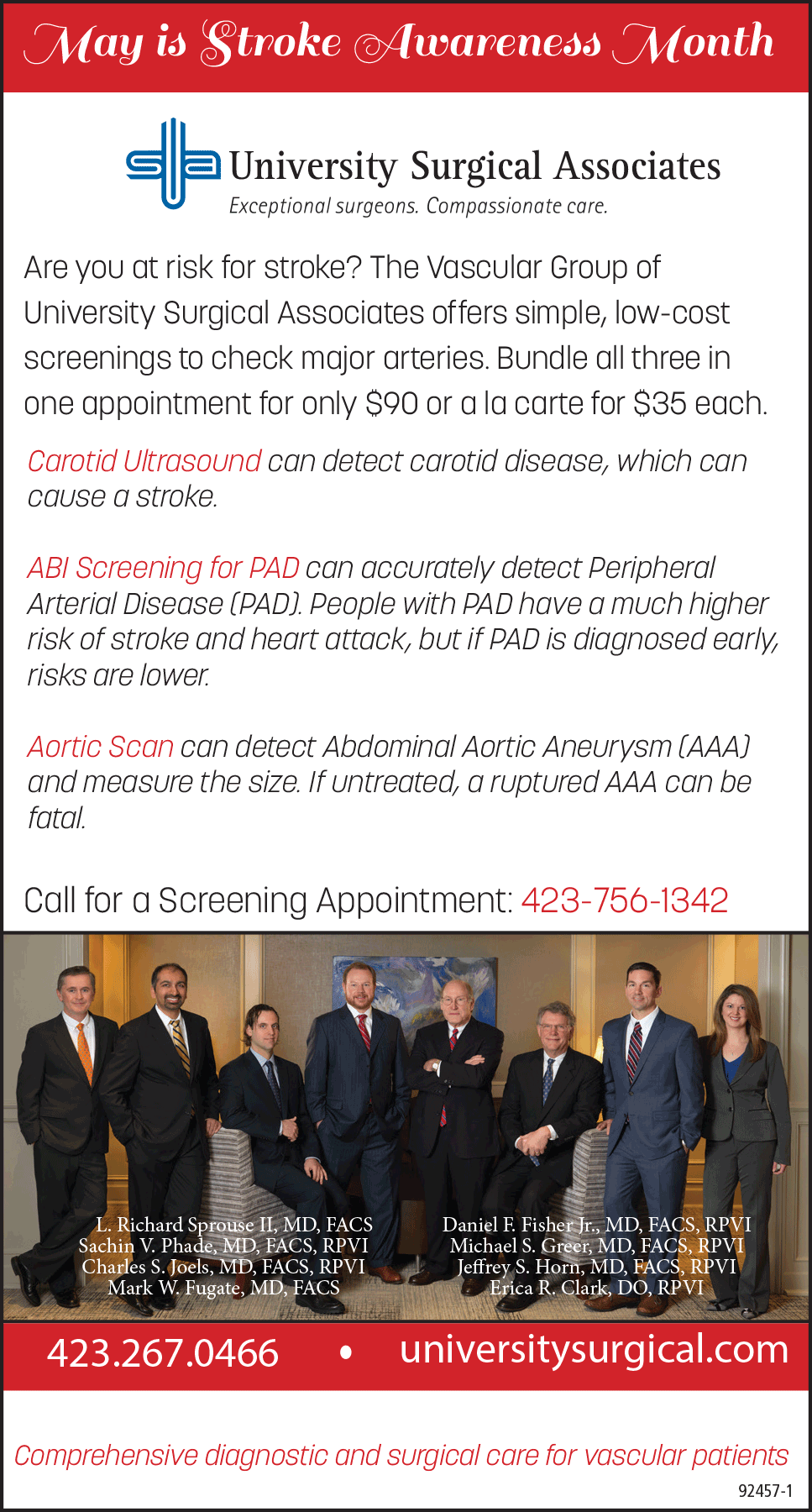There's a common misconception that you can't do anything to prevent a stroke. Strokes can seemingly come out of nowhere, yet effective screening tools are available that can predict a person's risk and provide an opportunity to reduce that risk before it's too late. Carotid artery ultrasound is a simple, painless, and affordable screening that clearly identifies a person's stroke risk. It's a test that Sgt. Terry Prescott of the East Ridge Police Department never knew he needed, but ultimately changed his life and health for the better.
Sgt. Prescott connected with the Vascular Group at University Surgical Associates (USA) for two reasons: his daughter, Janda White, the marketing director for USA, invited him to a free screening, and he's a first responder. As a way to say thank you, The Vascular Group of USA offered a free 3-in-1 vascular screening to first responders; law enforcement, firefighters and EMS teams, on Valentine's Weekend. The screening used ultrasound technology to check for carotid artery disease, abdominal aortic aneurysm (AAA), and peripheral arterial disease (PAD). Sgt. Prescott came to the screening to support his daughter, never considering what would happen next.
"I had no idea that I had any problems, and I didn't expect to hear that I was going to be a patient when I came in for a screening. Hearing they found an 80 percent blockage in my carotid was eye opening," remembers Sgt. Prescott.
After the ultrasound technologist discovered the blockage, it was reviewed by Erica Clark, D.O., vascular surgeon USA. "The purpose of the ultrasound is to evaluate how blood flow passes through the arteries to identify plaque and the individuals who are at significant risk of stroke," says Dr. Clark. "Sgt. Prescott had no other major health problems and was otherwise healthy. We were all surprised to find that he had significant carotid stenosis (or narrowing of the blood vessels), that I felt would require surgery to correct."
Why Screening Matters
Stroke happens when one of the arteries that supplies blood to the brain becomes blocked or bursts, which causes part of the brain not to get the blood it needs to live. Some of the first symptoms of a carotid artery disease are transient ischemic attacks (TIAs) or mini strokes. Loss of speech or hand function, or numbness and tingling in one side of the body that all resolve within 24 hours are signs you should never ignore. These indicate you may have significant carotid disease. And screening is even more important because more than half of people who eventually have a clinically significant stroke don't experience mini strokes or exhibit any outward warning signs.
"Age is always a risk factor for stroke because blood vessel walls tend to harden and develop more plaque as we grow older, but it's not the only thing to consider," says Dr. Clark. "Smokers, people with diabetes or end stage renal disease, those who have elevated cholesterol or poor diet control are all considered high risk for a significant narrowing of the arteries. For these individuals and especially those who have a family history, we can't overstate the importance of screening."
Surgical Treatment Clears Blockage
Before surgery to remove the blockage in his carotid artery, Sgt. Prescott met with Dr. Clark and her nurse, Charity Morris, RN, to more fully understand his condition and the surgical approach she would use to address it. His condition was serious enough that an open surgical procedure called carotid endarterectomy was required. The goal of the procedure was to open the artery, clean out the buildup of plaque and reestablish blood flow to the brain, effectively preventing a stroke.
Sgt. Prescott's surgery went smoothly, as expected, and he spent one night in the hospital before recovering at home. He's already back to work, feeling great and encouraging his friends and coworkers to make time for a simple test that likely saved his life.
"During my surgical consultation, Dr. Clark and her nurse explained everything that would happen during the procedure and took time to answer all my questions. I was just relieved to have the surgery rather than having the possibility of a stroke," says Sgt. Prescott. "I'm very happy that I made time for the screening – especially since they found a blockage. I've told several of the guys I work with that they missed a great opportunity, but it's well worth scheduling an appointment and getting checked out."
MORE INFORMATION
The Vascular Group of University Surgical Associates offers a low-cost, 3-in-1 vascular screening that includes the carotid artery, abdominal aortic aneurysm (AAA) screening, and peripheral artery disease (PAD) screening of the legs for just $90 or each separate screening for $35. To schedule a screening, call 423-756-1342. Learn more about USA Vascular Services at universitysurgical.com.

